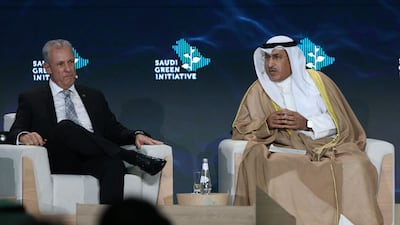Kuwait is developing a renewables strategy as it diversifies its energy mix, which is heavily reliant on fossil fuels, to include clean sources.
"We looked at the transition issue in a way that we need to make sure that we have to have a very clear plan, deliverable, wise and, at the same time, the economical factor is looked into," Kuwait's Oil Minister Mohammed Al Fares told reporters at the Abu Dhabi International Petroleum Exhibition and Conference (Adipec).
"We are putting a plan right now where we are trying to look at all different mixtures. And we are starting, [since] everybody is starting in this region with renewables related to solar."
Kuwait, one of the least diversified economies in the Gulf region, is looking at developing a 2-gigawatt wind and solar project.
The project is set to be tendered by the Kuwait Authority for Partnership Projects.
Mr Al Fares said the development will be in the form of a "joint venture between the government and the private sector".
Gulf oil exporters such as Saudi Arabia and the UAE and the region's smallest oil-producing nation, Bahrain, all announced initiatives to reach net zero emissions by the middle of the century, as part of their nationally determined contributions in line with the Paris Agreement.
Saudi Arabia and Bahrain plan to offset their domestic emissions by 2060, with the kingdom's state energy company, Saudi Aramco, set to achieve net zero by 2050.
The UAE, the first Arab nation to commit to achieving net zero, will reach that milestone by 2050.
"Kuwait is not far away from whatever you see in this region. But again, I want to make sure that what we say is what we want to deliver," Mr Al Fares said.
The country has lagged behind in the development of renewable projects as it enjoys one of the lowest break-even prices for crude.
This has resulted in the formation of a large rentier economy.

